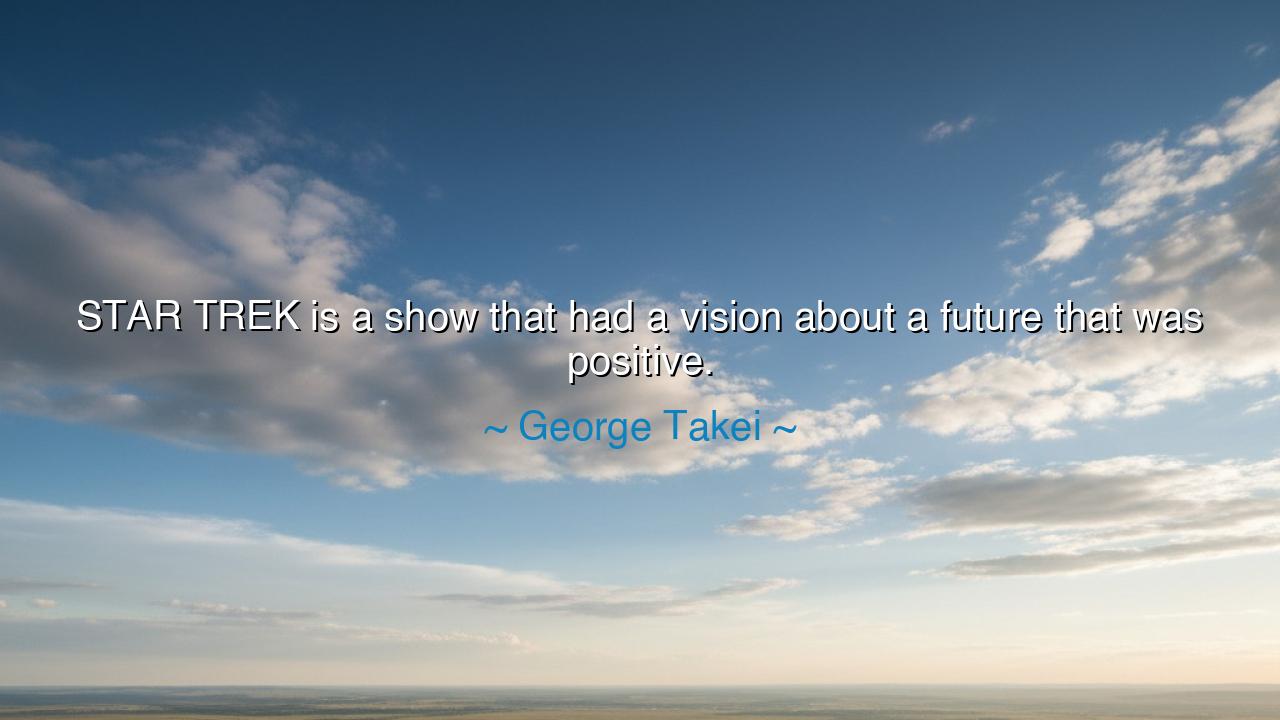
STAR TREK is a show that had a vision about a future that was






Hear the words of George Takei: “STAR TREK is a show that had a vision about a future that was positive.” In this declaration lies a prophecy of hope. For in an age shadowed by war, by the cold rivalries of nations, and by fear of destruction, there arose a tale that dared to imagine not ruin, but harmony. STAR TREK was not merely entertainment, but a torch lifted high, proclaiming that humanity could transcend its divisions and set its course toward the stars together.
The ancients too dreamed of such journeys. They spoke of Odysseus who sailed to unknown shores, of Jason who sought the Golden Fleece with companions bound by loyalty. Yet STAR TREK gave this ancient longing a new horizon, casting its heroes not upon seas of water but oceans of starlight. The vision was the same: that courage, fellowship, and wisdom could carry mortals beyond the known, if only they chose unity over strife.
Consider the time of its birth. In the 1960s, America was torn by civil rights struggles, the terror of nuclear war, and the bitterness of division. Yet on the bridge of the Enterprise, men and women of many nations—and even worlds—stood as equals. There was a Russian at the helm in the midst of the Cold War, a Black woman as communications officer in an age of segregation, an Asian helmsman when prejudice still weighed heavy. This casting was not chance, but destiny, embodying the positive future Takei speaks of.
Such stories remind us that art can shape history as powerfully as battles. When Nichelle Nichols, who played Uhura, considered leaving the show, Martin Luther King Jr. himself urged her to stay, for her presence was a beacon to millions who had never before seen themselves represented with dignity. Thus the vision of STAR TREK spilled from fiction into reality, strengthening the fight for justice and inspiring generations to dream beyond their limits.
So let the generations remember: to imagine a positive future is itself an act of heroism. For despair is easy, but hope requires courage. STAR TREK showed us not only ships and stars, but the possibility of a humanity united, wise, and bold. Its vision endures because it speaks to the eternal truth that we become what we dare to dream. And if we dream of light, then light may yet be our destiny.






ABAaaa Bbb
George Takei’s insight about *Star Trek*’s vision being positive makes me think about how much of that vision has resonated with generations of viewers. It’s more than just a sci-fi show; it’s about a belief in humanity’s potential. Yet, with the world facing so many challenges, does this positivity feel naïve or inspiring? Should we still hold onto *Star Trek*’s ideals, or has the world changed in ways that make that future impossible?
TTNguyen ngoc thuy tien
The idea that *Star Trek* had a vision of a positive future is such a refreshing reminder of the power of hope in storytelling. It’s amazing how the show portrayed a world where diversity and collaboration were key to progress. But in today’s media landscape, do we still see as much emphasis on positive portrayals of the future, or have dystopian narratives taken over? How important is it for us to have more optimistic stories today?
VMvo Micchi
Takei's words really speak to the heart of *Star Trek*’s appeal—it wasn’t just about exploring space, but about imagining a better world. However, in today’s context, can we really say we’ve moved closer to that 'positive future'? With so many current global issues, it feels like *Star Trek*’s vision is a bit more aspirational than attainable. Is it enough to just dream of a better future, or should we take actionable steps toward it?
MT10CT2-32- Huynh Minh Tam
I love how George Takei emphasizes the positivity of *Star Trek’s* vision. The series has always been about hope, inclusion, and unity, setting it apart from more dystopian portrayals of the future. But in a world that often seems divided, does *Star Trek*’s idealistic future feel more like an unattainable dream? How can we make the kind of progress *Star Trek* envisioned in our own world, where many issues still divide us?
NLTran Nhat Long
George Takei’s statement about *Star Trek* highlights the optimistic vision the show brought to science fiction. It’s interesting that the show imagined a future where humanity overcame its divisions and worked together for a common good. Given the challenges we face today, I wonder how much of *Star Trek’s* hopeful portrayal has influenced real-world technological and social advancements. Could such visions inspire real change in our society?